Representatives from four Greek Athonite monasteries—the Great Lavra, Iveron, Koutloumousiou, and New Esphigmenou—issued a statement in February against the background of the Ukrainian scandal and the recent visitation of a delegation from the Ukrainian schismatic church to Mt. Athos. Unfortunately, the statement is also itself rather scandalous, making several accusations against the Russian Orthodox Church and the Russian-tradition St. Panteleimon’s Monastery on Mt. Athos. Their arguments contain a number of factual errors, and what’s more, reveal a sadly hellenophilic-russophobic attitude that is prevalent in the Patriarchate of Constantinople today—but we would expect better from monastics.
It must be emphasized that this statement represents only the four monasteries listed above, and that the other monasteries of the Holy Mountain have condemned this statement as overly political, containing arbitrary accusations, and lacking the universal character of Mt. Athos, and have distanced themselves from it. Moreover, they expressed dissatisfaction at such texts dealing with the inner workings of the Sacred Community being leaked to the media.
While the statement has been condemned in the broader opinion of the Sacred Community, we have decided to make comments on the statement for the good of our readers, as the attitudes in the statement are unfortunately prevalent in certain Church circles today.
***
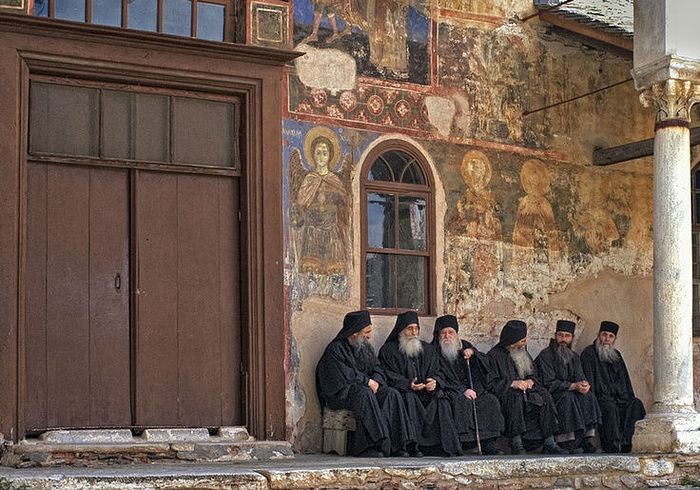 The Great Lavra. Photo: gidvgreece.com
The Great Lavra. Photo: gidvgreece.com
The result of the decision of the Holy Synod of the Great Church of Christ regarding the granting of autocephaly to Ukraine and the ensuing ecclesiastical actions were the realization of a number of the canonical obligations of the Ecumenical Patriarchate and the actualization of its certain rights as the First Throne of the Church, on the basis of the canons and the present order of the Church, as it was established and has existed for centuries.
Emphasis here could be placed on the “present order” of the Church. Orthodox Synaxis has a wonderful article detailing the development of Constantinople ecclesiology during the Ottoman period. The way that the Patriarchate views itself and its obligations today largely come from that period and how the Empire and Sultan dealt with its Christian population. Ukrainian bishop His Grace Tikhon of Gostomel has written the same—the Patriarchate’s status comes from developed tradition, not the canons. It is clear from these treaties that there is no canonical basis for Constantinople’s ecclesiastical invasion into the canonical territory of the Russian Orthodox Church and its unilateral granting of autocephaly to a schismatic conglomeration.
All of this concerns the canonical connection of the Ecumenical Patriarchate with the people of God and the other Orthodox jurisdictions, having nothing to do with matters of faith, representing yet another major contribution to the global procession of our immaculate faith and an important fraternal and peaceful success of the Greek Orthodox spirit, which, undoubtedly, always makes a positive contribution to the service of Orthodoxy, being its expression and itself being expressed by it.
Again, it’s certainly not a settled thing to say this crisis is not a matter of faith. Ecclesiology is a matter of faith, as is repentance, and the Ukrainian schismatics showed neither repentance nor concern for ecclesiology. They refused to return to the Church from which they left, insisting they have things their way or they would remain in schism. Philaret Denisenko initiated contact with the Russian Church in late 2017, but immediately backed out, realizing repentance would be required of him and his colleagues by humbly returning to the Church they had schismed from.
As Greeks, the holy monks are undoubtedly expressing things from their own point of view. But we question the intimation that every statement coming from a Greek monastery is automatically correct merely by virtue of its Greek ethnicity.
We also have to note here that the relationship between Greek monasteries on Mt. Athos and the Constantinople Patriarch have been rocky. They have ceased commemoration of him outright at times, while today some pray “for his correction.”
After that, as is known, the Russian side intentionally caused trepidation by the statements of the Patriarch of Moscow and his various employees, representatives of the clergy and laity, in which their faithful are forbidden from communing on the Holy Mountain, permitting them only in St. Panteleimon’s Monastery; wealthy Russians are called to “invest” in Russian but not Athonite monasteries,1 and at the same time statements were made recalling that Russian benefactors donated about 200 million to the Holy Mountain, which, according to the U.S. ambassador in Athens, acts “simultaneously as a Russian ‘soft power’ investment in a region having no international jurisdiction and financial transparency.”2 The description of the “region having no international jurisdiction and financial transparency” refers to the lot of the Most Holy Theotokos and the Russian donations to it.
It's hard to take seriously the claim that the Russian Church “intentionally caused trepidation” by noting that the faithful could not commune on Mt. Athos. Communion with Constantinople had already been broken, and that includes Mt. Athos. The statements specifically about Mt. Athos were made in response to questions from the faithful—they merely explained what had already been decided. Moreover, they were made with great pain of heart, because Mt. Athos is exceedingly dear to all Orthodox Russians. How are we supposed to see in that the intentional causing of trepidation?
We also find it rather unseemly (as did other Mt. Athos monasteries, by the way, in their statement against this very statement) that Russian foundations are being accused of only contributing to the Russian Monastery of St. Panteleimon. That is simply not true. And besides, is there anything reprehensible in restoring a monastery that was built and supported by the Russian Empire, as a holy place of Athonite monasticism? Should the Russian monks have simply waited for money from the EU or Greece (which may never come), out of principle not accepting money from Russia?
We also find it astounding that Mt. Athos monks take the U.S. Ambassador seriously about Russian “soft power.” Love for Orthodox monasteries and the desire to support them financially, an ancient Orthodox tradition, is “soft power?” This coming from a man who set the Ukrainian coupe d’état in motion, and has a stated purpose to turn Greeks against Russians as he did the Ukrainians?
The Sacred Community has repeatedly expressed its opinion regarding Russian aspirations for the Holy Mountain both in the distant and recent past, in particular, on the issue of Russian celebrations of the so-called “millennium of Russian monasticism on the Holy Mountain” and the property of St. Panteleimon’s Monastery in the area of Gurunoskiti [New Thebaid—Tsargrad].
It’s not clear how a celebration constitutes “aspirations” or why the Russian Church should not celebrate something so influential in its own life. St. Anthony of the Kiev Caves, the great founder of Russian monasticism, was tonsured into the angelic life on Mt. Athos in the tenth century. It would be profoundly strange if this millennial celebration did not happen.
Their point concerning New Thebaid Skete is also forced, given that it has existed since 1880 as a dependency of St. Panteleimon’s Monastery. But, restoration work on the skete in recent years, following its abandonment after the Russian revolution and a 2012 fire, somehow became a scandal and an instance of supposed Russian aspirations on Mt. Athos.
In 2017, the abbots of the same four monasteries that wrote this present letter asked Patriarch Bartholomew to do something about the dominance of Russians on Mt. Athos and demanded that any work on New Thebaid Skete be stopped and that measures be taken so the number of Russians would not increase on Mt. Athos. Of course, Patriarch Bartholomew had already taken measures to limit not only the number of Russian monks on Mt. Athos, but of all non-Greek monks.
Initially, the Community made an effort to maintain a moderate, monastic, and hesychastic position, so this place would abide in peace and prayer, outside the events and noise, pursuing the main goal of a normal Church position and preserving the unity of the monasteries, and also avoiding aimless upheavals and disquietude. Moreover, the given issue does not fall under the competence of the Holy Mountain.
At the extraordinary meeting at the height of the holiday break at the beginning of this year, the Sacred Community studied the letter of the new primate of the Church of Ukraine Epiphany, forwarded with the letter of the General Secretariat of the honorable Ecumenical Patriarchate. Great zeal was shown and in the end it was preferred not to participate in his future enthronement either by sending a congratulatory letter or by the physical presence of representatives of the Holy Mountain; although, as is known,3 ten years ago, the invitation of the Patriarch of Moscow, transmitted in the same way, was satisfied with the immediate appointment of a three-person delegation, and the above-mentioned emergency procedure was not needed.
Is it not curious that these representatives are so upset that St. Panteleimon’s won’t accept the schismatics, and yet the entire Sacred Community had already decided not to send a delegation to Dumenko’s enthronement, and not even to send a letter of congratulations? Are they comparing the visit of a schismatic who is canonically unrecognized by every Orthodox Church but Constantinople’s with the visit of the Patriarch of Moscow?
At first it was considered that the events that took place had achieved the established goal of silence. But the reality and fact of a known leak allegedly from “reliable sources” in the Sacred Community, which various people referred to, gave cause for many centers of propaganda both inside and outside of Greece to literally rage, serving, of course, whatever they pleased, only not Athonite unity, and so on.
It's rather convenient to blame the media for a lack of unity instead of blaming the controversial issue that has divided the monasteries.
Together with the foregoing, we are dealing with the phenomenon of the beginning of the visits of the clerics of the Church of Ukraine of various degrees in their new capacity, when they are provided with letters of recommendation from the Ecumenical Patriarchate, in which the aforementioned persons are recommended and their Church and sacred dignity are indicated.
These visits undoubtedly could have been avoided or have taken place much later if not for the immediate insidious involvement of the Russians in this matter of Holy Mount Athos.
What constitutes this immediate and insidious involvement? And what are the representatives really saying here? The schismatics were sent to Mt. Athos just to scorn the Russian Church? Is that a worthy foundation for a pilgrimage? Did some of the monasteries accept them just to scorn the Russian Church?
Thus, in the end we see that among the fighting “titans,” our sacred place strangely and without reason found itself at the epicenter of this fight, as a kind of trophy, which they claim, while completely ignoring its canonical dependence on the Ecumenical Patriarchate and political on the Greek state (as is defined by the Ustav of Holy Mount Athos). As a result, its self-governing status is ignored, inasmuch as efforts are made to destroy it by the insidious exploitation of its privileges, its necessary monastic appeal to itself, and its various problems.
It appears that the holy monks are ignoring the elephant in the room: that the schismatic “church” is not recognized anywhere except in Constantinople, and the monks who did not receive its delegation did not so out of disrespect for their ruling hierarch but out of respect for the holy canons. There is an ancient tradition: A monk must always be in submission to his ruling hierarch—unless he becomes heretical. Of course, the underlying cause is still being debated as has to be finally decided at a Pan-Orthodox Council; but monks, especially Mt. Athos monks, are famous for standing by their convictions. It is also unclear what Mt. Athos’ political dependence on the Greek state has to do with this.
The inclusion of St. Panteleimon’s Monastery in the so-called foreign institutions of the Moscow Patriarchate4 and the opening in Moscow of a special center for its financing with the aim of restoring it,5 guided by the intention, as the President of Russia said, “of reviving the monastery in all its greatness, as it was conceived by our ancestors,” drew the monastery into the sphere of Russian interests and distorted its connection to this day with Russia, turning it from a historical, traditional, and friendly connection into an economic dependency and external observation, accompanied by the disturbing expansion of Russian interference in all of its internal issues, such as, for example: the commemoration of the Patriarch of Moscow as primate at the Divine services, which takes place at the demand of the Patriarchate of Moscow, and moreover after the commemoration of the Ecumenical Patriarchate, the local bishop, as primate—the same practice that is used in Russia.
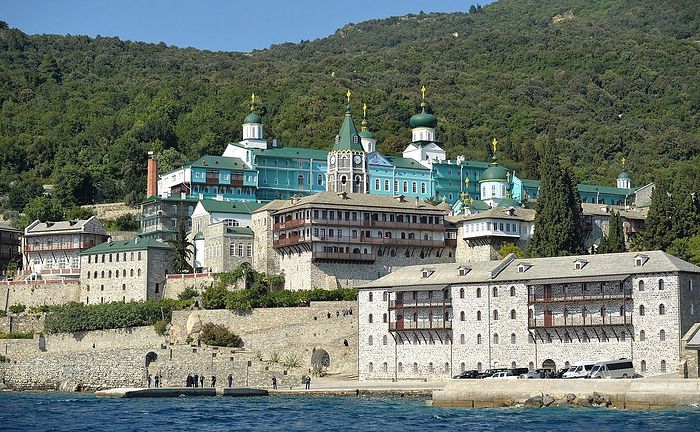 St. Panteleiomon's Monastery. Photo: wikimedia.org
St. Panteleiomon's Monastery. Photo: wikimedia.org
Claiming that the monastery has been included in the foreign institutions of the Moscow Patriarchate is not an accurate representation of the source that the authors provide. It merely says that “Bishop Antoniy of Bogorodsk, head of the Moscow Patriarchate office for institutions abroad, began his working visit to Mount Athos.”
Again, how can they complain about the monastery being restored? The money for restorations has to come from somewhere. Mt. Athos as a whole receives funds from UNESCO, the European Parliament, and elsewhere.
Further, the UNESCO website states that:
The Hellenic State has placed the responsibility for the protection and conservation of the natural and cultural property into public agencies, namely the Ministry of Education and Religious Affairs, Culture and Sports, General Secretariat of Culture, through the responsible 10th Ephorate of Byzantine Antiquities, the Centre for the Preservation of the Athonite Heritage, the Ministry of Environment, Energy and Climate Change, and the Ministry of Foreign Affairs (Directorate for Churches – Mount Athos Administration). The monuments are protected by the provisions of the Archaeological Law 3028/2002 “On the Protection of Antiquities and Cultural Heritage in general”, and by separate ministerial decrees published in the Official Government Gazette.6
Thus, the whole of the mountain is clearly within the sphere of Greek state interests. It’s unclear why that is acceptable, but it’s unacceptable for a Russian monastery to receive funds from Russia.
Further, the monks writing here are making simple factual errors when they refer to the commemorations at the Divine services. First, His Holiness Patriarch Kirill is not regularly commemorated at St. Panteleimon’s, but only when a Moscow Patriarchate hierarch is serving and commemorates his Patriarch. They also complain that Pat. Bartholomew is commemorated first and then Pat. Kirill, saying that according to Russian usage means they are commemorating Pat. Kirill as the primate, and Pat. Bartholomew simply as the local bishop, but this is exactly backwards. In Liturgies in the Russian Church, it is Pat. Kirill who is commemorated first and then the local bishop, which means, St. Panteleimon’s is giving first “rank” to Pat. Bartholomew in its commemorations.
On the other hand, we have the statements of the chairman of the so-called Imperial Palestinian Society of Russia and former Prime Minister S. Stepashin to the German magazine der Spiegel, where he says that, “the topic of Athos should not concern Greece at all. Athos is an independent monastic republic, something similar to the Vatican state in Rome [the Greek literally says, “it should have become essentially independent, like the Vatican”—Tsargrad] and that “we have … problems not with the Greek Church, but with the Ecumenical Patriarch Bartholomew.”7
This is the opinion of one man, who moreover does not represent the Russian Orthodox Church. Is that something to be overly worried about? Many in the Russian Church agree that Stepashin’s parallel was regrettable. And yes, the Greek Church and the Patriarchate of Constantinople are different bodies so it’s not surprising that Russians should have different relations with them. It’s unclear why this is noteworthy.
And even the Greek Church has its own problems with Constantinople.
Here it should be noted that His Beatitude Patriarch Kirill of Moscow8 was the Deputy of the Imperial Palestinian Society of Russia before his election, who has long been involved in Athonite issues, such as, for example, the issue of Esphigmenou Monastery. As the chairman of the Department for External Church Relations of the Russian Church, persuading the Ecumenical Patriarch not to touch the occupiers of the monastery, he declared: “First, this monastery is dear to us as the place of tonsure of the founder of Russian monasticism St. Anthony of the Caves, and secondly, everything that is happening now with Esphigmenou reminds our faithful of the sorrowful history of the past decades, when after a similar forceful action, St. Elias Skete on Mt. Athos, created by the labors of monks and benefactors from Russia, became inaccessible to Russian monks.”9
Why is Pat. Kirill referred to as “His Beatitude” instead of the appropriate “His Holiness?” Is this a subtle “demotion” from Patriarch to Metropolitan? Perhaps it reflects Constantinople’s conviction that the Local Churches other than the original Pentarchy are somehow incomplete, conditionally autocephalous Churches.
The physical expulsion of the ROCOR monks of St. Elias Skete is not one of Constantinople’s finer moments. Interestingly, the article about the skete on one Greek-American’s blog completely skips over this history, saying only: “After a period of decrease and decline during the last century, the Skete of Prophet Elias was occupied again in 1992 by the devout and diligent brotherhood of the industrious Elder and Dikaios Archimandrite Joachim (Karachristos), an event signaling the start of a new period of sound administration and spiritual flourishing for the Skete.”
All of this is in line with the rumors constantly promoted by the International Heritage Fund of the Russian St. Panteleimon’s Monastery that “In the 1920s, the course of the Greek state to Hellenize Mt. Athos put up obstacles to the influx of Russian monasticism, and the monastic life in the Skete of New Thebaid and in the monastery itself fell into decline,”10 and leads us to the conclusion that attempts are being undertaken to manipulate the monastery, not to directly question its official connection with the Greek state (which is impossible to call into question), but to present it as a connection of occupation, a connection of despotic domination, but not as the natural presence or historical justification and legitimate presence of Hellenism to the rights of its natural predecessor—the Byzantine Empire, as if it requires defense when needed and when not needed.
The Ecumenical Patriarchate is putting up such obstacles now. It’s not hard to believe it’s been happening since the 1920s. Also, the thread drawn through time from the Byzantine Empire to what is now a completely secular state of Greece could make the monks shoot themselves in their own feet. If Mt. Athos is so intertwined with the Greek government, then why not sell off its possessions to pay off the national debt, like the Greek railroads and ports? Or turn it into a tourist attraction, politically correctly inviting women as long as they are willing to pay for it?
And, finally, to all of this is added, as a crown, the permission given during an official speech of the Patriarch of Moscow for Russian pilgrims to Athos to commune exclusively and only at St. Panteleimon Monastery. Here are his words: “Russian Orthodox can visit ‘our’ St. Panteleimon’s Monastery which is least responsible for the destructive actions of Constantinople.”11 The publication ends with the words: “It should be noted that the words of Patriarch Kirill caused a storm of applause from the clergy present.”12 We wonder if the storm of applause from the clerics present was caused by the granted permission or the word “our?”
While I cannot agree with the strange Russophobia that is behind the letter’s mentioning of this statement from Pat. Kirill, I can say that it is inconsistent to break communion with the Patriarchate of Constantinople but to make an exception for one monastery because it happens to be beloved by the people. Broken communion is broken communion—I don’t see how there can be exceptions.
Moreover, the opinion recently submitted by St. Panteleimon’s Monastery speaks about how “for centuries” it has been a place of podvig for many generations of Russians, linking its entire argument with St. Athanasius the Athonite (that is, indirectly mentioning the fact of Russians living in the monastery by the tenth century), and deliberately ignoring the entire dramatic history of the late-nineteenth century, connected with the expulsion of Greek monks from the monastery, pan-Slavism, Ambassador Ignatiev, the San Stefano Peace Treaty of 1878, and the creation of the imperial regime of “Great Bulgaria,” and, as a consequence, the Ilinden uprising that aimed to annex Macedonia to Bulgaria, and the subsequent struggle for Macedonia and the present vicissitudes connected with the Macedonian issue, not to mention the relatively recent expulsion of Russian diplomats due to their interference in the affairs of Greece (one of them was the aforementioned chairman of the Imperial Palestinian Society),13 and that Russia has already recognized the state of Skopje as “Macedonia” for twenty-six years, and, finally, the complete elimination of the presence of Athos from the Russian state, despite the fact that for centuries it was actively present there, and since 1650 in the most central place. This presence was forcibly lost and continues to be illegally deprived to this day thanks to the known tricks of the Russian Church.
O Kyrie Eleison, are they really bringing Macedonia into this? Could their argument really be deteriorating to: “You did that to us back a century and a half ago and we haven’t forgotten it. Now it’s time to get you back.” The buzzword “Macedonia” has a rallying effect on Greeks, but even a non-Greek expert on Balkan history would scarcely comprehend what on earth Macedonia has to do with the Russian monastery on Mt. Athos not accepting schismatics.
And are these fathers denying that Russians have been laboring at St. Panteleimon’s for centuries? What is their basis for such a claim?
It’s interesting that the monks are listing as a grievance that certain Greeks were expelled from the monastery in the nineteenth century, but when Russians complain of being expelled (as with Prophet Elias Skete, for example), this is just dismissed as baseless accusations.
As for the expulsion of the Russian diplomats (and the Russian clergy being denied visas to Greece), should we really be so naïve as to not see the obvious U.S. interference here through Ambassador Geoffrey Pyatt, who the Guardian says “emerged as a Russian hate figure after the Maidan revolution occurred during his tenure in Kiev”?
And regarding the final complaint about the elimination of the presence of Athos from the Russian state: This requires some explanation. Are they referring to the Soviet period? If so, that would be a strange accusation indeed, given the Russian Church’s persecuted status under the Soviet government.
Thus, all of this, as well as the fact that the history of the Russification of St. Panteleimon’s Monastery is only 150 years old, this specific opinion, unfortunately, forgets. And this is explained as follows: “to preserve unharmed the traditional ties with the Russian Church.” At the same time, they refer to article 9 of the statutes of Holy Mount Athos, to the self-governing status of the monastery, which, was has been said, in the case of Russian interference is destroyed in various ways, but which, as we see, in relation to the Sacred Community, the Greek state, and the Ecumenical Patriarchate, remains strong and unharmed. Further in this same opinion, with reference to article 184 on proselytism, it is stated that from now on St. Panteleimon’s Monastery will not receive clergy from the Church of Ukraine and will not pray together with the other Athonite brethren at the Divine services if such clergy are present. If, for example, such clergy arrive to the Sacred Community-Epistasis, the representative of St. Panteleimon’s Monastery will leave the hall, and if they go into the church, he will leave the church. Here it is impossible not to recall letters and statements from the zealots of Esphigmenou Monastery, similar in their arguments, from the 1970s, which led the monastery itself and those living in it to well-known vicissitudes, struck a heavy blow against our sacred place, and continues to torment it. Back then and today, someone doesn’t like something, and both then and now the Ecumenical Patriarch is only a pretext, even if the Russian Church doesn’t just speak with the Pope, but allows Catholic “priests” to serve, recognizing their Baptism and sacred order by a simple prayer of absolution (see The Reception of Catholics into the Russian Church).14 We wonder—are Russian bishops who receive the heterodox in such a way allowed at St. Panteleimon’s Monastery? Why are there no temptations, no protests in this case? Everyone knows the past connection of this monastery with the schismatics from the Church Abroad who even served in the monastery and sent people there to live (Αντώνιος-Αιμίλιος Ταχιάος: Η παρουσία Ρώσων μοναχών στον Άθω (11ος-20ος αι.).15
The Sacred Community decided that the decision to receive the schismatics or not would be left up to each individual monastery, so how can they complain that St. Panteleimon’s won’t accept them?
The comparison with Esphigmenou is ridiculous. There is zeal, and there is zeal not according to knowledge. Esphigmenou’s zeal led it out of the Church. They are in communion with no one, rejecting the whole Church. Meanwhile, St. Panteleimon’s is only rejecting those who are outside of the Church and recognized by no one (except Constantinople). In fact, the similarity here is between Esphigmenou and the Ukrainian schismatics—both are outside of the Church because of pride and their insistence on doing things their way.
The accusation that the Russian Church concelebrates with Catholic priests is so farcical that it would be laughable were it not actually tragic. There are Catholic priests whom the Russian Church received by economia, making them Orthodox priests by vesting. The canons of the Church allow for economic receptions, and everyone knows the Church can do this. Or do these monks consider Catholics received by Chrismation to be still Catholics?
While I can agree that reception and ordination by vesting is extreme economia, even an abuse of economia, that does not mean these men remain Catholics. These are case-by-case examples of individuals converting to Orthodoxy. This argument is especially disingenuous coming from Athonite monks who support Constantinople’s decision to receive thousands of clergy wholesale without any form of reception or ordination beyond a Synodal statement. Moreover, schismatics must return to where they schismed from—to the Moscow Patriarchate in this case—whereas converts from Catholicism or elsewhere can convert in any jurisdiction. The canons allow for economic receptions, but they do not allow for one bishop to encroach upon the territory of another. There is no comparison between what the Russian Church does and what Constantionple has done.
Again, characterizing the Russian Church Abroad as schismatic (while at the same time accepting the Ukrainian schismatics!) is simply farcical. See His Beatitude Archbishop Anastasios of Albania’s response to Pat. Bartholomew to understand the falsity in how Constantinople interprets ROCOR’s history. And it wasn’t only St. Panteleimon’s that had contact with ROCOR. There have been Athonite elders who, despite the Sacred Community’s ban on receiving ROCOR priests into communion, recognized the ROCOR as a stalwart upholder of Orthodox tradition.
Obviously, there was no such sensitivity there. Perhaps, ultimately, the criteria here is not religious but only ethnophyletist?
Oh, the irony.
Last year, under the pretext of the now-settled question of St. Panteleimon’s Monastery in the region of Gurunoskit, a written opinion was submitted to the Sacred Community, setting out various problems connected with the Russian aspirations on Athos, which concerned the situation then, and also the acquired experienced of the Sacred Community’s commission on the Russian questions. It spoke of Russian goals on Mt. Athos, of their oneness with the resurgent pan-Slavic aspirations of the past, and generally of the attempts coming from Russia to greatly emphasize the fabricated and pretentious “otherness” of St. Panteleimon’s Monastery in contrast to the other monasteries. Observing current events, and despite the monastery’s assurances to the contrary, it can be stated that the long-expressed concerns, unfortunately, are confirmed, and that the monastery is inclined towards isolation and towards becoming a weapon in the hands of outsiders, under seemingly reasonable pretexts, in relation to the establishment and status of our sacred place, which, causing a schism, noise, and division here, and sowing their tricks on a grand scale, aimed at the entire Holy Mountain, expecting to achieve their main aforementioned goal, which is to manipulate by means of St. Panteleimon’s Monastery. Neither this monastery nor the rest of Mt. Athos should fall into this web.
It’s curious that they provide no sources for these supposed claims of St. Panteleimon’s “otherness.” As far as we can tell, all of these accusations about Russian aspirations are based on Russians daring to repair their dilapidated monastic dwellings and their rejection of the schismatics. What about the fact that Greek monasteries, such as Philotheou and Karakallou, have also rejected the schismatics? Are they merely under Russian sway?
Also, does the mention of pan-Slavism imply that the Russian monastery is colluding with the Serbian Hilandar or the Bulgarian Zographou Monasteries against the Greeks? The drama... Such suspicions could be easily dispelled by simply asking the representatives of those monasteries about it at a Sacred Community assembly, but it’s hard to imagine the holy monks voicing such suspicions.
Having laid out the above-mentioned conclusions and questions, we entreat the Sacred Community with brotherly love to take into account the following suggestions:
-
By submitting its opinion, St. Panteleimon’s Monastery violated the monasteries’ decision about exercising restraint, which extended even to the point that, for the sake of preserving their unity and unanimity, prevented the submission of the corresponding opinion of Stavronikita Monastery. Hastily and without due diligence, it was mistakenly accepted during the reading of the draft minutes and easily passed into the minutes of the meeting. For this reason, we believe that it should be sent to the honorable Ecumenical Patriarch to clarify its objections and resolve the monastery’s issues.
-
St. Panteleimon’s Monastery should express its objections to the decree of the Moscow Patriarchate regarding the communion of the Russian faithful and join the general practice of the other nineteen monasteries, which make no distinction between Russian and non-Russian Orthodox Christians.
It’s not the monastery that is making a distinction here, but rather the Russian Church is distinguishing between St. Panteleimon’s and the rest of the Holy Mountain.
-
St. Panteleimon’s Monastery should cease commemorating two primates in the Divine services and comply with article 5 of the statutes of Holy Mount Athos.
-
The Sacred Community can neither accept nor put into action the idea of applying various practices in regards to letters of recommendation of clerics from the autocephalous Church of Ukraine, because it contradicts article 173 of the statutes of Holy Mount Athos, which say the following: “No hierarch can celebrate any services on the Holy Mountain if he is not provided with a letter from the Ecumenical Patriarch, indicating that he has no obstacles to celebrating the services, and without the permission of the Sacred Community or one of the monasteries… Any cleric of a lower order should have such a letter for the Sacred Community from his Church authorities.” A letter of recommendation of the Holy Epistasis is its obligation according to the decision of the Sacred Community; it reads the corresponding patriarchal letter, and this letter of recommendation stems from the patriarchal letter, expresses its authenticity, and imprints, according to the statutes (article 5), “the spiritual jurisdiction of the Great Eastern Church of Christ on the Holy Mountain,” and cannot be the subject of any negotiations. Failure to provide it is a direct challenge and insult to the given recommendation of the Ecumenical Patriarch, the Sacred Community, and the interested monastery, and also the cleric who has arrived for a visit, who observes the canonical order and arrives having permission and a recommendation. The refusal to issue it also violates numerous decisions and recommendations of the Sacred Community, in particular, to St. Panteleimon’s Monastery, which has had many episcopal guests who did not take care to receive the letter of recommendation from the Epistasis or, what’s more, celebrated the Divine services without the permission of the Ecumenical Patriarch. Finally, protesters must not hide behind the anonymity of the Sacred Community, shifting responsibility to it and referring to it as an obstacle to celebrating the services by the given clerics, inasmuch as celebrating the services in any monastery by any cleric is regulated by the monastery itself, while, on the contrary, hospitality is traditionally shown to everyone, independent even of religious confession.
If Russian bishops have been indeed serving without securing the appropriate permissions, that is a problem.
But then again, I don’t recall Pat. Bartholomew securing permission to interfere in Ukrainian Church life…
And hospitality cannot be forced. Each monastery has its own rules about hospitality; for example, at what times of the day, which monks are blessed to speak with visitors, etc. It is understandable that the monks of St. Panteleimon’s Monastery—who by the way are mostly ethnic Ukrainians and everyone on Mt. Athos knows that—are loathe to offer coffee and sweets to their schismatic countrymen who are out to destroy the canonical Ukrainian Church.
-
Finally, if this external interference does not stop, continuing to torment our sacred place, and attempts continue to impose upon us, as our own problem, a question of a non-Athonite and non-dogmatic character, but of a pastoral importance, concerning inter-Church relations, we believe it will give rise to a great spiritual problem for our holy place.
So in conclusion, it’s all the fault of the Russians, and the dire anti-canonical phenomenon of the “Ukrainian Orthodox Church” created by the Constantinople Patriarchate is not the issue here. Again, all we can say is, Kyrie Eleison...
The representatives of the monasteries:
The Great Lavra—Hieromonk Nikodemos
Iveron—Hieromonk Anthony
Koutloumousiou—Elder Hieromonk Philotheos
Esphigmenou—Elder Hieromonk Gabriel

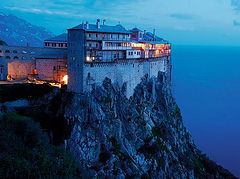
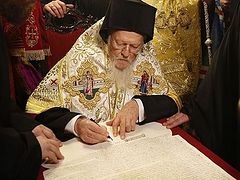
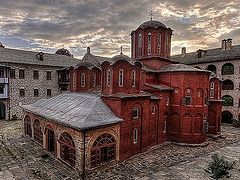
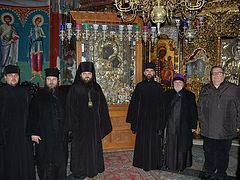
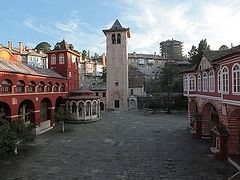
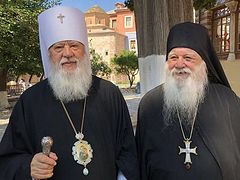
It is not an abuse of economia but actually a paranomia. This practice is the product of the problematic ecclesiological position prevalent in the Russian Church that the latins maintain valid apostolic succession. Archimandrite Ambrose Pogodin points this out approvingly in his study on the reception of converts and the MP has in the past written to the CP that: “We honor the apostolic succession of the latin hierarchy and we accept its clergy in the rank that they held...”. Additional sources could be cited to show this.
The letter is right to point out the MPinconsistency
Note to Anthony: S-400 is a defense system that effectively shoots down aggressor's missiles before they can blow up civilians. Sad that NATO countries think everyone should be helpless before their weapons.
Funds raised by Russian churches for the Greek
People.
And the Russians stopped the genocide of the
Christians of Syria.
Three years ago the Russian president visited
Athens and Mount athos and sought to get closer
To Greece.
The occupation government of Greece whose
Allegiance is neither to Orthodoxy which
Sustained the Greek nation during the ottoman
Centuries or to its own citizens followed the
Dictates of the west and rejected Russia.
Yes Greece needs repentance as the step to
Reconciling with God and freeing itself from
The present disasters. Remember in 2004
When the us and Britain sought to impose
The annan plan on cyprus the Russians killed
It at the UN Security Council.
And when archbishop ieronymos of Athens went
To moscow he received funds raised by
Troubling times are ahead and the Church will not fall. We have to try to remain true to the faith even though some will turn away. The scriptures say that the Bishops are responsible for our souls. What does Bartholomew think of his RESPONSIBILITY on judgement day? I just don't get his thinking. May God help us! Gary Cox
Attacks on mount athos and the Russian church.
Bartholomew must be deposed.
Many of my fellow Greeks have been
Brainwashed by western propaganda. There are
Many Greeks like myself who see the ugliness
Of bartholomew' s collaboration with the west
Against orthodox russia.
I pray fervently for the liberation of greece and mount
Athos from the western yoke. I am pro Russian
Politically and ecclesiastically. I am dissapointed
In the athonite monasteries who support
Bartholomew.
Greece has fallen into ruin under the west. May
Greece remain orthodox with Russia.